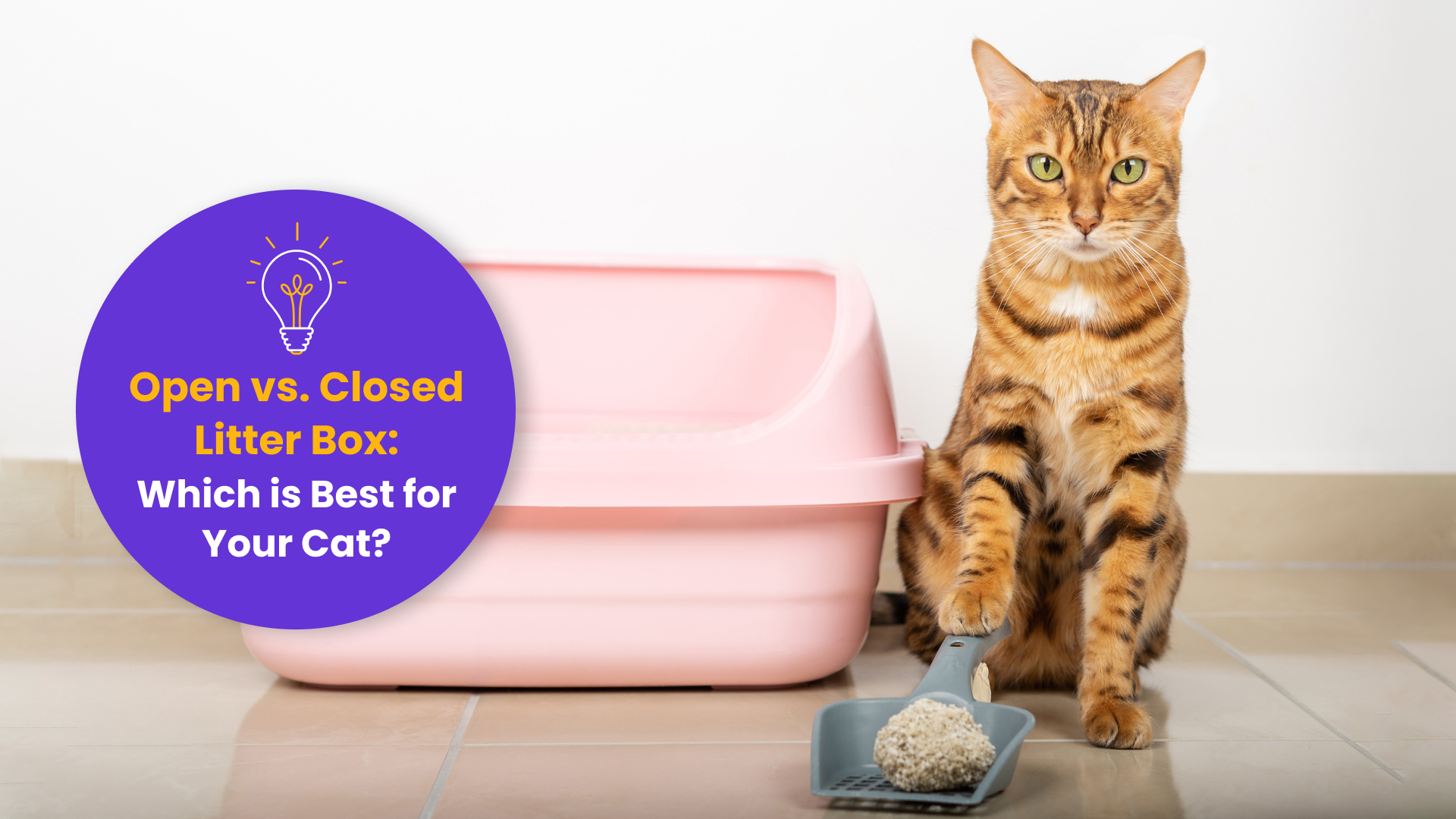Whether you’re a new cat parent or a seasoned kitty caretaker, a litter box is always going to be one of the most important items in your home.
Will your fur baby enjoy the freedom of an open box? Or perhaps they prefer the privacy of a closed box? Join us as we dive into the pros and cons of each, helping you decide which option is best suited to your cat’s needs.
Advantages and Disadvantages of Open Litter Boxes
An open litter box is a simple, tray-like container without a lid or cover. It provides easy access for your cat to enter and exit, and it typically has low sides for convenience. Open litter boxes come in various shapes and sizes, making them a versatile and straightforward option for cat owners.
Pros
- Ease of access. An open litter box doesn’t require your cat to navigate flaps or awkward entrances.
- Eases anxiety. Because open litter boxes offer a clear view of their surroundings, they’re often a great fit for anxious cats as well as felines who aren’t used to using a litter box.
- Fewer odors. An open litter box provides natural ventilation, reducing the build-up of unpleasant odors.
Cons
- Lack of privacy. Many cats would prefer to do their business in private, something an open litter box can’t give them.
- Odor spread. Even though an open litter box offers better ventilation, it also means that odors can become more apparent in your home.
- Litter tracking and scatter. With an open litter box, there’s a higher chance of litter getting kicked or tracked outside of it.
Advantages and Disadvantages of Closed Litter Boxes
A closed litter box, also known as a covered or hooded litter box, features a lid or cover that encloses the litter area. The cover often has an entryway or flap for the cat to go in and out.
Pros
- Greater privacy. Cats who prefer to do their business without anyone watching prefer an enclosed space such as this.
- Better odor control. With a closed litter box, you won’t have as many unpleasant odors reaching the living areas of your home.
- Reduced litter tracking. Using a closed litter box means you won’t have to deal with as much litter tracking as you would with an open box.
Cons
- Cleaning challenges. It’s not as easy to scoop and clean litter when it’s contained inside a closed litter box.
- Space restrictions. If you’re living with a larger cat, they may potentially have a harder time using a closed litter box.
- Anxiety. Certain cats simply refuse to do their business in an enclosed space and would prefer a more open environment. This is especially true with anxious or feral cats.
Comparing Costs and Maintenance
Now that you have a better idea of the pros and cons of closed versus open litter boxes, let’s look at how they compare in terms of cost and maintenance.
Open Litter Boxes
An open litter box is generally less expensive than a closed version since there are fewer parts to it – it’s simply an open tray.
In terms of maintenance, open litter boxes are quicker and easier to clean since there are no covers or flaps to maneuver around. Regular scooping is also straightforward, and the entire box can be easily emptied and washed.
Since odors can be an issue, it’s important to pick the right litter.
Closed Litter Boxes
Closed litter boxes are the “fancier” option if you will, so expect to pay a little more, especially if it has special features such as carbon filters. Some models may require replacement filters or liners, adding to the ongoing costs.
Closed litter boxes are slightly more time-consuming to clean due to the cover, which needs to be removed or lifted. Some designs can also make scooping more awkward.
The good news is that they are better at containing odors, especially if equipped with carbon filters or ventilation systems. However, if not cleaned regularly, odors can build up inside the enclosed space.
Choosing the Right Litter Box for Your Cat
Choosing between a closed or open litter box for your cat depends on several factors, including your cat’s preferences, your living situation, and your own priorities. Here are some key considerations to help you decide:
Cat’s Preferences
- Behavior and personality: Observe your cat’s behavior. Some cats prefer the privacy and security of a closed litter box, while others might feel trapped or anxious inside a covered box. Kittens and older cats with mobility issues may find open boxes easier to use.
- Habits: If your cat tends to scatter litter or dig vigorously, a closed litter box will be better at containing the mess.
Odor Control
- Smell sensitivity: If you are highly sensitive to odors, a closed litter box with good ventilation or carbon filters can help reduce unpleasant smells.
- Cleaning frequency: Be honest about how often you can clean the litter box. Closed boxes can trap odors if not cleaned regularly, so they might require more frequent attention to prevent buildup.
Space and Placement
- Location: Consider where you plan to place the litter box. If it’s in a high-traffic area or an area where you entertain guests, a closed box might be more discreet and visually appealing.
- Space constraints: If you have limited space, an open litter box might fit better in tight areas. Closed boxes often take up more room.
Cost
- Budget: Open litter boxes are usually more affordable than closed ones. Consider your budget and whether you’re willing to invest in a potentially higher-cost option for added features like odor control and reduced litter scatter.
If you’re unsure, you can try both types and observe which one your cat prefers. Some pet stores offer return policies, allowing you to test different models without committing to a final purchase.
Ultimately, the best choice is the one that meets your cat’s needs and fits your lifestyle. Paying attention to your cat’s behavior and comfort can guide you to the right decision.
Final Thoughts
There is no right or wrong answer about whether an open or closed litter box is better. It all depends on your preferences and that of your cat’s.
Stay open to the idea that you may need to switch to a different litter box if one variation doesn’t work.
FAQs
1. Is a closed litter box better?
A closed litter box isn’t necessarily better than an open one but there are some specific benefits. For one, closed litter boxes can be more aesthetically pleasing, control odors a little better, and prevent litter scatter. However, not all cats will be willing to do their business in an enclosed space.


 0 comments
0 comments Copy link
Copy link Share on Twitter
Share on Twitter Share on Facebook
Share on Facebook Share on WhatsApp
Share on WhatsApp
Comments(0)